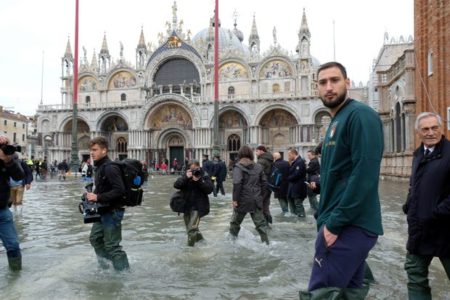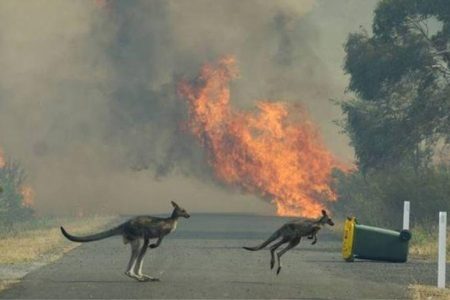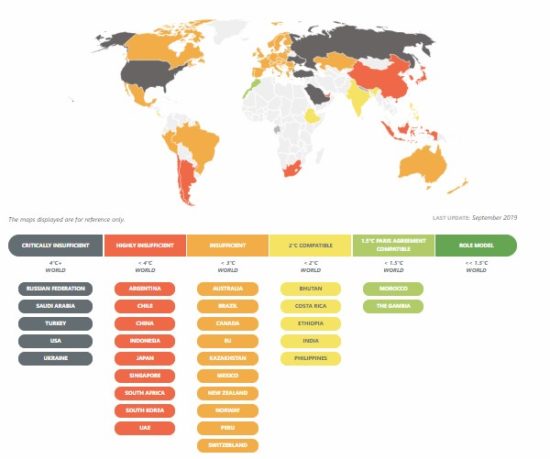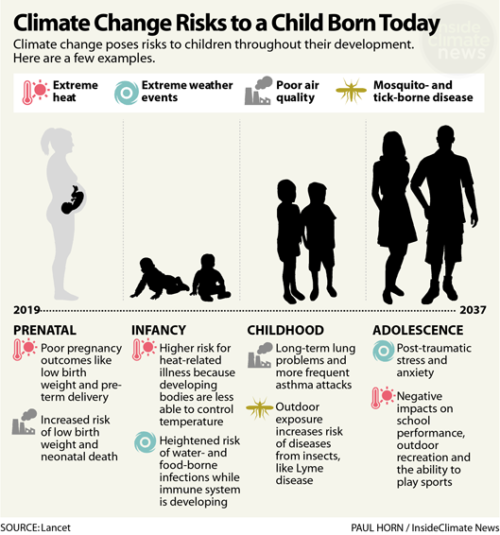November 16, 2019 – The headlines are none too pleasing to the vast majority of us who recognize we face an existential climate crisis.
Venice Goes Under Water
If you were in Venice this week you came face-to-face with the world of the near future.
Venice has seen sea levels rise 10 centimeters (almost 4 inches) in the last 50 years. It doesn’t seem much but when you add a wind blowing from the south and high tides, you get what this city’s mayor called “climate change in action” and “a wound that will leave a permanent mark” on the city.
Water levels on two consecutive days rose 1.8 and 1.5 meters (approximately 6 and 5 feet). A meeting of the Veneto regional council had just concluded without it passing funding to tackle climate change when the building where it was sitting became inundated.
A bookstore near St. Mark’s Square, aptly named Aqua Alta (meaning high water in Italian) found itself underwater in almost two meters of water.
The city, which was founded in the year 697 CE (AD) will likely completely flood in the next 50 years without technological intervention in the form of a massive investment in protective dikes and seawall gates. Meanwhile the current attempt to do this, known as Project Moses, and designed precisely to protect the city, remains well behind schedule, over budget, fraught with corruption from politicians and contractors, and all of this still on the go sixteen years after the project was approved.

Bushfire Conversations Not to be Equated with Climate Change in Australia
The unhinged political leadership in Australia continues to ignore the climate crisis.
With bushfires threatening the state of New South Wales and the country’s largest city, Sydney, the country’s Deputy Prime Minister, Michael McCormack, described the conflagrations as old news just happening a bit earlier than normal this year.
Not to be outdone, the Prime Minister, Scott Morrison, is trying to outlaw climate protests describing those who go out on the street as “indulgent” and “radicals.” Morrison, who is big on coal, argues that China is the problem and that they need to do more. Meanwhile the country is opening a new coal mine with China the preferred customer for what is produced.
But getting back to McCormack’s comments on a radio talk show this week, he stated: “we know it’s getting drier, we know it’s getting…very warm.” Duh! But what that has to do with global warming….apparently nothing.
Too bad Greta Thunberg can’t get Down Under to shame these fellows to the core of their being.

A Report Card on the Global Response to the Climate Crisis
If you think that climate change is an existential crisis and you live in one of the 175 countries that signed the Paris Climate Agreement in 2015, then I hate to tell you, almost every signatory is failing to achieve any of the interim milestones agreed to back then.
The flaw of the Paris agreement was it was non-binding. Countries were left to set their own targets and they did. But according to the Climate Action Tracker, an organization that assesses progress related to the Agreement targets, almost none have succeeded in meeting interim milestones. Climate Action Tracker forecasts we are headed for more than twice the 2 Celsius (3.6 Fahrenheit) rise in atmospheric mean temperatures. That’s global mean temperatures rising by 4 Celsius (7.2 Fahrenheit). And at the poles expect those numbers to hit double digits.
To make matters worse, greenhouse gas emissions in 2018 rose by 2.7%.
So who among the nations of the world have been on target to meet their Paris pledges?
Morocco, and Gambia on target for a 1.5 Celsius rise, and Bhutan, Costa Rica, Ethiopia, the Philippines, and believe it or not India for a 2.0 Celsius rise, even though the latter this week has witnessed unprecedented smog enveloping the capital Delhi; the cause, vehicle traffic, cooking fires, and neighbouring farms burning their fields after harvest.

New Lancet Medical Journal Report Lays Out the Risk from the Climate Crisis to Children Born Today
Having seen the previous headline it shouldn’t be a surprise that if a child was born today it would experience a diminished quality of life from that of its parents. Besides extreme weather events, displacement from coastal cities from sea-level rise and sunshine flooding, children will experience respiratory problems from extreme atmospheric heat and pollution, increases in asthma, and exposure to tropical insect-borne diseases in temperate latitudes.
The Lancet states that “the life of every child born today will be profoundly affected by climate change, with populations around the world increasingly facing extremes of weather, food and water insecurity, changing patterns of infectious disease, and a less certain future.”
More frequent heatwaves will have a profound effect on newborns.
One of the authors of the study states:
“We roughly know what [it] looks like from a climate perspective…We have no idea what it looks like from a public health perspective, but we know it is catastrophic. We know it has the potential to undermine the last 50 years of gains in public health and overwhelm the systems we rely on.”
The study looks at 41 climate change indicators and notes that the threat to children will start in the womb and accompany them all the way to adulthood.
They are predicting:
- increases in low birth weight and neonatal deaths.
- heat stress because children find it much harder to regulate body temperature than adults.
- their less developed immune systems will make them more vulnerable to air, and waterborne diseases.
- intense heat waves will lead to increased incidents of heatstroke in teens, as well as impaired thinking for students sitting in unairconditioned schools.
And you thought parents are vigilant about children today. In the decades that follow expect hyper-vigilance in a world where the climate crisis will be in full swing.








